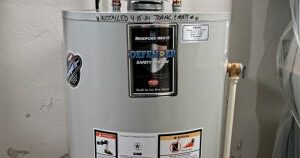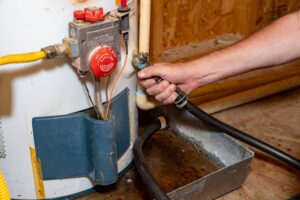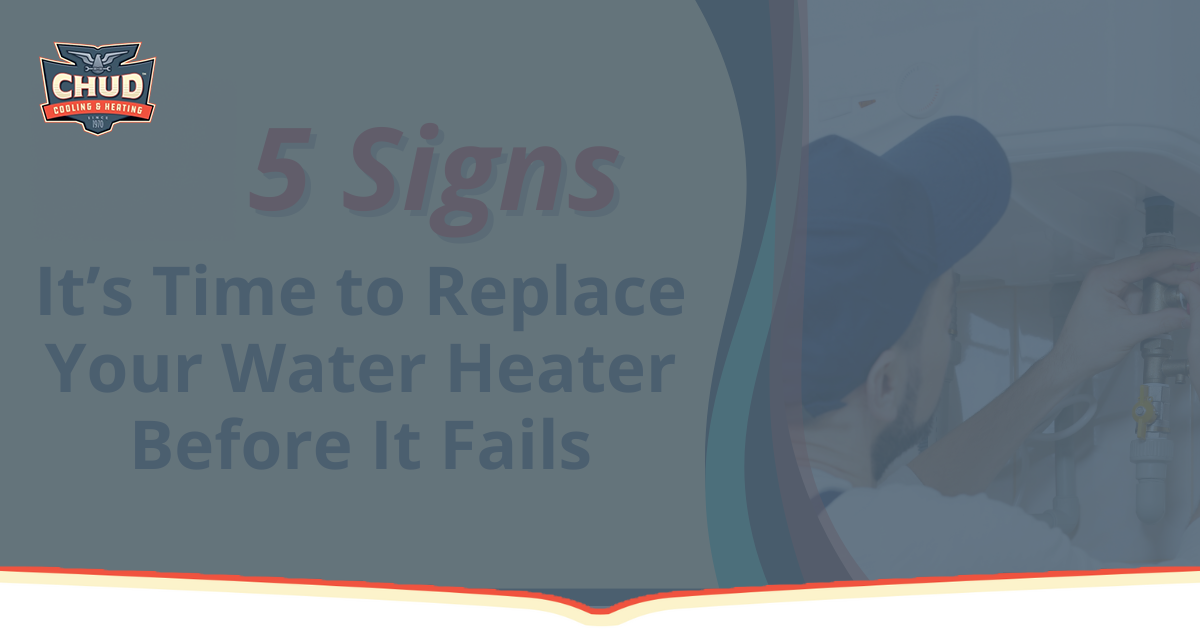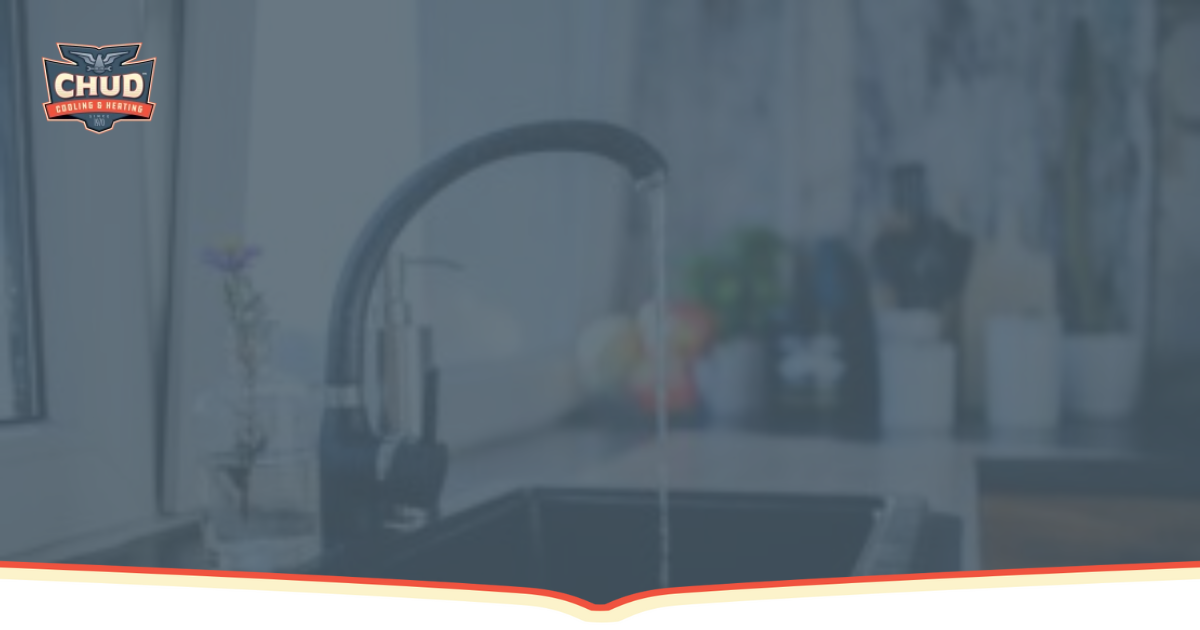5 Signs It’s Time to Replace Your Water Heater Before It Fails
Homeowners often don’t consider water heater replacement unless there’s a major problem. But replacing a unit before it fails avoids being without hot water and paying for costly emergency plumbing services. The upfront investment can skip the stress and protect your household budget.
Is your water heater past its prime? We’ll look at five signs it should be replaced and provide advice on how to prevent a system from failing.

How Long Do Water Heaters Last?
Age is one factor in considering water heater replacement. A tank water heater typically lasts from eight to 12 years. Its lifespan can vary depending on brand, model, and parts quality. Tankless water heaters can last about 20 years since they don’t run as frequently and are less prone to wear and tear.
When to Replace a Water Heater
Aside from your water heater’s age, there are other reasons to consider replacing it. The following signs mean you should consult with one of our plumbers:
-
Water Doesn’t Stay Hot
Inconsistent hot water is one of the most common signs of a failing water
heater. Unless the thermostat is reset, the water temperature should stay the same. One
or more failing components can cause a disruption. Mounting issues can cause
symptoms such as:
- Hot water runs out when showering, cleaning, or cooking.
- The temperature fluctuates as you’re using hot water.
- The water is only lukewarm, regardless of the temperature setting.
-
Poor Water Quality
Sediment, rust, and deteriorating metal in the tank can contaminate your water supply. The water coming out of the faucet may appear cloudy or a rusty brown. Rusty water can be harmful to your health. It may also mean your water heater is damaged. Suspended sediment and particles are indicative of a problem as well.
Earlier in your water heater’s life, flushing the tank or replacing the anode rod can resolve sediment issues. However, later on, a change in water quality is a reason to consider water heater replacement, especially when only hot water is affected.
-
Leaking Water Heater
Water heater tanks are permanently sealed. Therefore, a leak is an ominous sign that the unit is near the end of its life. Pooling water around the base means the tank is in danger of bursting or has already failed. Even moisture around the base or a drip on the tank’s surface is a serious concern.
Repairs may be possible if the leak is due to a loose or faulty valve, which can be tightened or replaced. Pipes and connectors can also leak; fortunately, they are repairable. Call a plumber to check your water heater. If possible, they’ll repair the leak; otherwise, they’ll replace the appliance.

-
Too Much Noise
Excessive noise is another common sign of a failing water heater. It’s often caused by accumulated sediment in the tank. If enough material builds up, it can cause the heating element to overheat and fail. Unusual sounds can also originate from various other damaged or worn-out components.
Contact Chud Cooling & Heating if you hear any of these noises:
- Banging
- Popping
- Rumbling
- Knocking
- Screeching
- Ticking
- Humming
- Crackling
- Sizzling
- Hissing
-
Your Energy Bills Are Too High
Do you keep track of your energy bills? Knowing the health of your water heater is one reason to. If your monthly utility bill increases over time or suddenly, consider having your water heater checked out. An aging system can develop issues that cause it to work harder and longer to maintain the set water temperature. Therefore, it uses more energy.
At this point, only a water heater replacement can offset the increase in energy consumption. A newer, more energy-efficient model can lower your long-term energy costs. Thus, you may save on operating expenses instead of paying more for energy and frequent repairs.
Repair vs. Replacement: When to Make the Call
Like many homeowners we work with, you may prefer water heater repair over replacement. A repair is worthwhile if the issue is relatively minor and the unit isn’t failing. Oftentimes, you can decide which path to take.
For most people, this decision comes down to what’s most affordable. Repairs usually cost much less than replacing a water heater. However, if your system is over 10 years old, doesn’t provide sufficient hot water, and needs frequent repairs, water heater replacement is the best option.
Weighing the cost-benefit of replacement can help you decide what to do. If the cost to repair a unit is over 50% of the cost to replace a water heater, we generally recommend purchasing a new one.
How to Extend the Life of Your Water Heater
People usually see value in how long things last. However, paying for one repair after another is not ideal financially. But what if you could extend the life of your water heater and avoid major repairs?
Both are possible by following these water heater maintenance tips:
- Flush the Tank: Over time, minerals and particulates in your water supply build up in the water heater tank. Flushing the water heater once or twice a year reduces this buildup and can prevent damage, improve efficiency, and increase the unit’s lifespan.
- Turn Down the Thermostat: Lowering the thermostat to around 120℉ can reduce wear and tear on your water heater. It also reduces the risk of anyone in your household getting scalded by hot water.
- Test the Pressure-Relief Valve: This simple test entails lifting the valve handle and letting the water flow. Have the valve replaced if it doesn’t open, no water comes out, or it leaks after being closed.
- Replace the Anode Rod: The anode rod attracts minerals and sediment to slow down corrosion in the tank. In the process, it breaks down over time, leaving your water heater vulnerable to damage and premature failure.
- Schedule Annual Maintenance: Professional maintenance ensures your water heater’s mechanical parts are working smoothly. It can help your water heater last longer and may be required by the warranty.
Schedule a Water Heater Replacement Consultation Today
Are you still deciding whether to repair or replace your aging water heater? The experts at Chud Cooling & Heating can evaluate your existing unit, answer your questions, and help you make an informed decision. We offer various solutions to meet your hot water needs and budget, including gas, electric, and tankless water heaters.
Contact us to schedule a consultation or learn more about our water heater and HVAC services.






